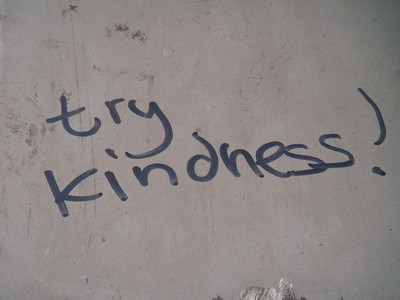The kindness of others
Friends, enemies, and strangers

There is a concept in Buddhism that is pivotal to understanding the Dharma. It is called “dependent arising or dependent origination.” The term “dependent arising” is used in different ways in Buddha’s teachings. It can describe how we take rebirth in cyclic existence. Dependent arising also indicates that things depend on causes and conditions, all the essential parts that make up phenomena (including us), and the concepts and labels that we apply to those phenomena. Everything arises in dependence on other factors. All sentient beings, human or otherwise, are part of this complex web.
In other words, no living being is an island. Unfortunately, our Western culture seems to emphasize our individuality, making us all think that we are concrete, unchanging and independent. This causes us to view the world as separate from ourselves and then we start to look at everyone and everything from the standpoint of how it either benefits or harms us. This delusion creates what are called “attachments” and “aversions” which we know better as lust, greed, hatred, anger, violence and prejudice.
In our ignorance we start to classify people into three categories: friends, enemies and strangers. We give the label “friends” to those people we are attached to. Why are we attached to them? They satisfy our material and emotional needs and wants. Anyone who appears to harm us in some way or who interferes with what we want when we want it we call “enemy.” Towards these people we feel anger, hatred, jealousy, belligerence, and so forth. And “strangers” are everyone else in the world who we couldn’t give a wit about. We don’t know them and and since they don’t affect us one way or the other, we are indifferent or apathetic about them.
We fail to realize another very important Buddhist teaching, that of impermanence and change. These categories of friend, enemy and stranger are not stagnant. How often have we had a friend or family member slip into the enemy category? Or an enemy suddenly become a friend? Or a stranger become a friend or enemy? Or a friend or enemy wind up as a stranger? In short, our feelings of attachment, anger, and apathy towards friends, enemies, and strangers respectively are not reliable, first because they arise due to how these people relate to ME (forget about how they relate to everyone else!) and second because these people go from one category to another in our minds according to different circumstances.
Buddhism teaches yet another critical concept and that is “equanimity.” When we develop equanimity we can overcome our attachment, anger and apathy and have equal hearted concern for all beings. We can learn to value and respect everyone no matter whether we consider them a friend, enemy or stranger because they have all shown us some form of kindness if we think about it deeply. In fact, discriminating and dividing people in friends, enemies, and strangers becomes less important to us. When we see that someone who we consider an enemy has also been kind to us, they don’t seem to be such a big, bad enemy anymore. They become a person who means well but made a mistake, and we’re able to forgive.
Of course, it is easy to see the kindness of friends so I needn’t say much about that. But what about strangers? If it wasn’t for the kindness of strangers who made our clothes and this building and the roads we drove on to get here, not to mention the cars we rode in, I would be standing up here talking to you naked without this podium. And you would be sitting on the ground naked listening to me. You may say these people were just doing their jobs to make a living. But we have benefited from their efforts, and that is a kindness. Everything we use and that keeps us alive is due many people’s kindness both here in this country or perhaps in some far off impoverished country.
But what about our enemies? How could they possibly be showing us kindness? Well, if we are serious Buddhist practitioners we are trying to develop our qualities of love, compassion, generosity, patience, tolerance, and fortitude. Do our friends or strangers help us attain those qualities? Not so much. But our enemies certainly test our resolve and help us to develop those virtuous behaviors. So, yes, that is a kindness. Therefore, we should treasure our enemies. How radical an idea is that?
Recently I was meditating on the kindness of others. Besides my parents, a woman came to mind who was probably the kindest and most influential person in my life. Ida Gartrell Peterson was an elementary school teacher who I was fortunate enough to have for both third and sixth grade. I was an obnoxious little boy with significant behavioral problems. Mrs. Peterson had excellent teaching skills but she was also the epitome of kindness, compassion, and patience. She saw my real potential and was able to turn me away from my evil side. What was even more remarkable was the fact that she was the first African American to teach in my all white elementary school. Back in the late 50s and early 60s this was very controversial and disturbing to many parents. They wanted to get rid of her. I remember distinctly my parents fighting to keep her at the school. Even at that young age I knew this was the right thing to do and I was so proud of my father and mother for standing up for what was right.
Ida Gartrell Peterson passed away in 1999. I am presently trying to find her family and have written to the elementary school I attended in Philadelphia to see if they can help me find them. Mrs. Peterson went on to receive a PhD in education from the University of Pennsylvania in 1985 and spent the rest of her career teaching at a black college in Atlanta. I have also contacted this college. I regret that I didn’t try to find this woman 30 years ago and thank her for all her kindness and compassion. But at least I can try to thank her family now.
As I was Googling I found a website of a professor at Syracuse University. He spoke of a teacher at his elementary school in Philadelphia who had a deep impact on his life. It was Ida Gartrell Peterson. A number of years ago, after she had passed away, there was a reunion of some of her former students. It is very evident that she must have influenced the lives of many young people during her career. Kindness and compassion should have nothing to do with race, ethnicity, or religion. They are human qualities that are only hidden by our ignorance.
If it wasn’t for my parents Mrs. Peterson could have been my enemy. I could have easily succumbed to the prejudice of the time. But due to the open mindedness of my father and mother she became a friend. Unfortunately, after I left elementary school I allowed her to become a stranger. I will always have a tremendous regret for allowing that to happen.
Kenneth Mondal
Ken Mondal is a retired Ophthalmologist who lives in Spokane, Washington. He received his education at Temple University and University of Pennsylvania in Philadelphia and residency training at University of California-San Francisco. He practiced in Ohio, Washington and Hawaii. Ken met the Dharma in 2011 and attends teachings and retreats on a regular basis at Sravasti Abbey. He also loves to do volunteer work in the Abbey's beautiful forest.


